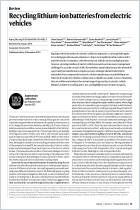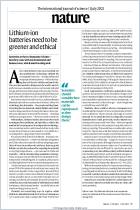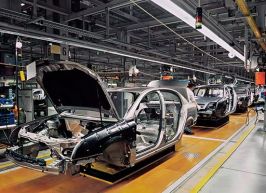
Effects of Battery Manufacturing on Electric Vehicle Life-Cycle Greenhouse Gas Emissions
Recommendation
The production of electric cars is increasing worldwide, resulting in lower greenhouse gas emissions. But manufacturing lithium-ion batteries produces significant CO2, and mining the needed metals creates additional environmental issues. Governments are considering constructing greener electrical grids and recycling programs to extend battery life cycles, but available data is fragmented. This briefing by the International Council on Clean Transportation urges people to look beyond electric vehicles and discover ways to build a better battery.
Summary
About the Author
The International Council on Clean Transportation (ICCT) is an independent nonprofit US organization that provides technical and scientific analysis to environmental regulators.






















Comment on this summary or Start Discussion